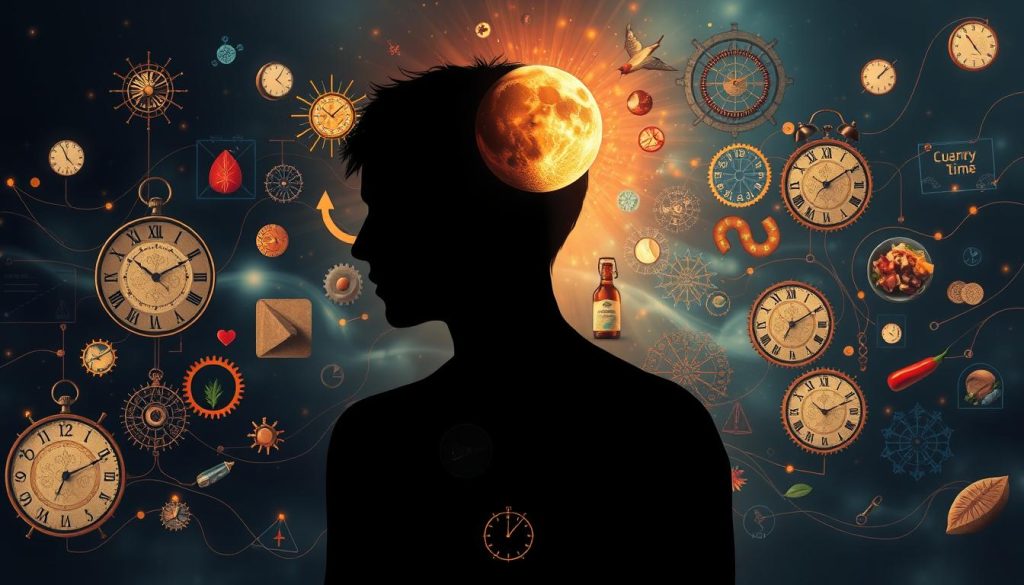Ever felt super awake at some times and really tired at others? It’s all about your biological clock. This amazing internal timer controls when we sleep, wake, and even how our hormones work. Let’s dive into how it affects our daily lives and how to sync up with it for better health.
What is a Biological Clock?
Our bodies have an internal timekeeper called the biological clock or circadian rhythm. It controls our sleep, hormone release, body temperature, and digestion. It works with sunlight and temperature to help us follow a daily routine and stay healthy.
The Circadian Rhythm
The circadian rhythm is our body’s internal clock. It runs on a 24-hour cycle. A part of the brain called the suprachiasmatic nucleus (SCN) controls it. The SCN keeps our body in sync with day and night by responding to light.
The Impact on Daily Routines
Our biological clock affects our daily life a lot. It tells us when to be awake and when to sleep. It also controls our hunger, digestion, mood, and how well we think. If our clock is off, like from jet lag, we might feel tired, have trouble sleeping, or find it hard to focus.
| Aspect of Daily Life | Impact of Biological Clock |
|---|---|
| Sleep-Wake Cycle | Determines when we feel sleepy and when we are most alert |
| Appetite and Digestion | Regulates hunger hormones and the body’s metabolic processes |
| Cognitive Performance | Influences our ability to focus, remember, and make decisions |
| Mood and Emotions | Can affect our overall emotional state and sense of well-being |
Factors that Influence Your Biological Clock
Your biological clock, or circadian rhythm, controls many body functions. But, it can change due to age, gender, and what’s around you.
Age and Gender
As we get older, our body clocks shift. Many sleep earlier and wake up sooner. This is because of hormone changes, like melatonin, which helps us sleep.
Hormones also differ between men and women. This affects their body clocks in unique ways.
Environmental Cues
Things outside us, like light and temperature, also affect our clocks. Morning light helps set our rhythms. Evening dim light makes us sleepy.
Staying consistent with sleep and wake times is key. It keeps our body clocks in sync.

Knowing what affects your biological clock is important. It helps you match your daily life with your body’s natural rhythm. By understanding age, gender, and environmental impacts, you can improve your health.
The Importance of Alignment with Your Biological Clock
Keeping our daily routines in sync with our biological clocks is key for health. When we match our schedules with our internal clocks, we sleep better, think clearer, and avoid chronic diseases. But, if we disrupt our circadian rhythm, we face health issues like insomnia, obesity, and metabolic disorders.
The benefits of circadian rhythm alignment are many. Our bodies work best when we stick to a regular sleep-wake cycle. This lets our cells and organs do their jobs well. By aligning our routines with our biological clock, we enjoy:
- Improved sleep quality and duration
- Enhanced mental alertness and focus
- Better mood regulation and reduced stress levels
- Stronger immune function and disease prevention
- Healthier metabolic processes and weight management
But, disrupting our biological clock can harm us a lot. Irregular sleep, wrong light exposure, and schedule mismatches can lead to health problems. These include:
- Insomnia and other sleep disorders
- Increased risk of obesity, diabetes, and cardiovascular disease
- Decreased cognitive performance and impaired decision-making
- Heightened susceptibility to mood disorders, such as depression and anxiety
- Weakened immune system and a higher risk of infections
Understanding the importance of aligning with your biological clock is the first step to better health. By knowing our circadian rhythms and aligning our activities with them, we unlock our full health potential. This leads to a more fulfilling and healthy life.

| Benefits of Circadian Rhythm Alignment | Consequences of Biological Clock Disruption |
|---|---|
|
|
Signs Your Biological Clock is Out of Sync
Have you noticed changes in your sleep or mood lately? These could mean your biological clock is off. Keeping our internal clock in sync is key for feeling good. Spotting signs of trouble is the first step to getting back in balance.
Sleep Disturbances
Sleep issues often point to a biological clock problem. You might find it hard to fall asleep or wake up a lot at night. Or you could feel really tired during the day.
When our body’s clock is out of sync, it messes with our sleep. This leaves us feeling tired and not refreshed.
Mood Changes
Our mood can also be affected by a disrupted biological clock. You might feel more irritable, anxious, or even depressed. These feelings often come with sleep problems.
Our body’s natural rhythms help control our mood and emotions. If you’re feeling off and tired, it’s time to check your biological clock. Fixing these issues can help you feel better and more energetic.

Strategies to Reset Your Biological Clock
Resetting your biological clock can greatly improve your health. It helps you sleep better, feel more energetic, and think clearer. There are many ways to reset your clock and keep a healthy sleep schedule.
Embrace Light Exposure
Light control, especially in the evening, is key. Light affects our body’s internal clock. Natural light in the day and less blue light at night help your body know when to sleep and wake.
Prioritize Consistent Sleep Hygiene
Good sleep habits are also important. Go to bed and wake up at the same time every day. Have a calm bedtime routine and avoid exciting activities before bed. This helps your body adjust to a regular sleep pattern.
Resetting your biological clock takes time and effort. But, the results are worth it. By following these tips, you can manage your sleep and enjoy being in sync with your natural rhythm.
Biological Clock and Health
Our biological clocks are key to our health and happiness. When they’re in sync, we feel better. We manage our weight better and avoid chronic diseases.
Weight Management
Our clocks affect how we manage our weight. Irregular sleep and light at night mess with our hormones. This makes us hungrier and slows our metabolism.
By matching our daily life with our body’s clock, we can keep a healthy weight. This helps us avoid weight ups and downs.
Disease Prevention
A healthy clock helps prevent diseases. For example, it lowers the risk of type 2 diabetes and heart disease. It even helps fight some cancers.
Knowing how our clocks work is important. Taking steps to support them helps us stay healthy. This reduces the risk of serious illnesses.

